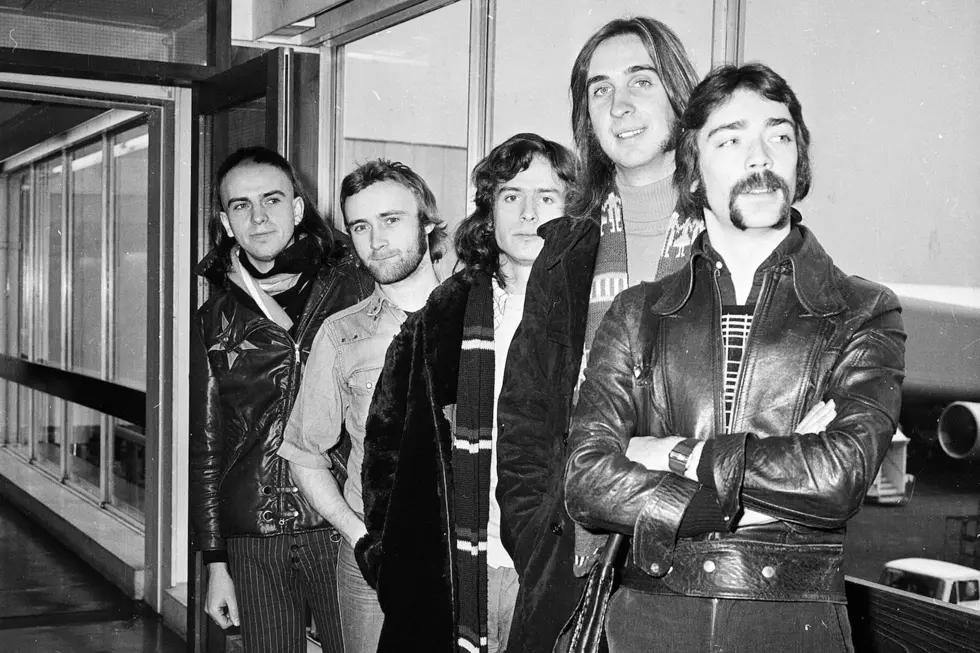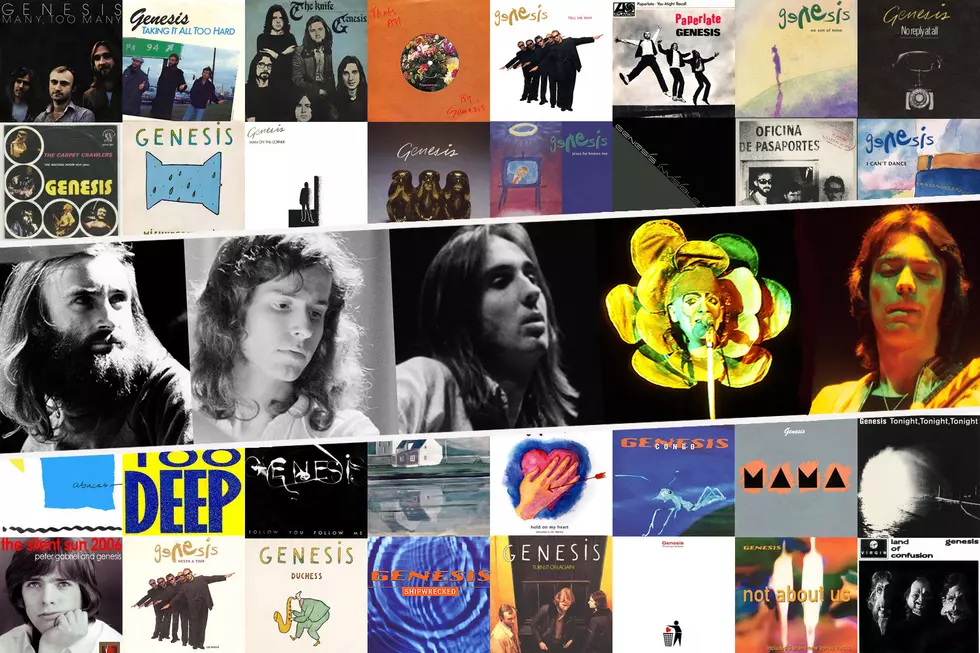
When Genesis Reconvened For One Last Phil Collins Album, ‘We Can’t Dance’
When Genesis entered the studio to record their 14th studio album in the spring of 1991, they were coming off their biggest commercial success — and headed for a major change.
The band's previous LP, 1986's Invisible Touch, set a new sales record for the venerable act, racking up more than six million copies in the U.S. alone and sending an incredible five hit singles — including the No. 1 title track — into the Billboard Top 5. At this point, each member of the trio was actively pursuing a solo career, and the years immediately after Invisible Touch saw frontman Phil Collins and guitarist/bassist Mike Rutherford both score major hits with side projects, but after clearing their calendars of outside obligations, they got back to business.
Perhaps unsurprisingly, given that they'd started spreading themselves a little thinner creatively, the members of the band weren't exactly working with a stockpile of new material when they reconvened. "We started this album with absolutely nothing," Collins told Music Connection. "No vocal ideas, no musical ideas, nothing. It was just us going into the studio and improvising our way around. There are no rules."
That might sound like a somewhat daunting way of working on a new album — especially when you're one of the biggest rock bands on the planet — but as keyboardist Tony Banks pointed out, starting from a blank canvas had its advantages.
"We've pretty much made that method a policy over the last couple of albums because we feel that's the best way to make a record that is totally distinguishable from our solo efforts," explained Banks. "If you start bringing in ideas – even small ideas – there's a tendency for that person to want to kind of lead at that point, and that produces something that can be done on our solo records. So we try to keep the Genesis stuff away from all that."
The new album, titled We Can't Dance and released on Nov. 11, 1991 in the U.K., came together after a period of significant change for the music industry. In the years after Invisible Touch, the compact disc format skyrocketed in popularity, forever altering the way people listened to music — as well as greatly expanding the amount of music an artist could fit on a single release. For a number of acts, the CD's longer runtime served as an unfortunate invitation to stuff a record with extra filler, but it worked in Genesis' favor.
Listen to Genesis Perform 'Driving the Last Spike'
As the band's pop profile rose during the '80s, they faced increasing demand for their more streamlined, radio-friendly work, which came to dominate the public perception of their sound while eating away at album space for more of the longer, more musically adventurous stuff they'd been known for in their earlier days. With over an hour of room to work in, Genesis were able to have their cake and eat it too on We Can't Dance; the album had no shortage of pop single material — six songs in all were released to radio, five of which broke the U.S. Top 40 — but it also made room for plenty of longer tracks. Of the 12 songs that made the LP, two ("Driving the Last Spike" and album closer "Fading Lights") clocked in over 10 minutes.
"Historically," Banks argued in the We Can't Dance press kit, "our strength has always lay in being able to give ourselves a bit of room to breathe. We work well in long songs; it gives us a chance to do more instrumental work, and a chance to tell more of a story with the lyrics."
Ultimately, We Can't Dance continued in much the same vein as the handful of Genesis albums leading up to it, and had the distinct advantage of arriving while Collins' dominance of pop radio was still near its peak — so while it was probably unreasonable to hope it would meet or exceed the commercial expectations set by Invisible Touch, it was obviously in line to be one of the year's bigger releases – and it lived up to its billing, topping the charts in the U.K. and hitting No. 4 in the United States.
Unfortunately for fans, the album would also end up marking the end of an era. Genesis mounted a major tour in the wake of We Can't Dance, lining up 70 dates throughout 1992 and later commemorating them on the (separately released) two-disc set The Way We Walk. As had been the case for a decade, they went on hiatus after the tour concluded, and Collins resumed his solo career with the release of 1993's Both Sides — but this time, he wouldn't return. In 1996, Collins announced his departure from the lineup, sending Genesis in a different direction ... and eventually, to their demise as an active entity.
Although Collins' growing profile as a solo artist had made Genesis' future seem tenuous for years, it was still a blow for fans, some of whom continue to hope for new music. But if the Collins-led Genesis lineup had to eventually say farewell, at least they were able to do so with an album that honored their roots to some extent.
"At this point in time, we honestly feel that this is our best album," Banks said of We Can't Dance. "But we also accept the fact that we might not feel that way in a year or two. But I really do feel that this album will stand the test of time a bit better than some of the other ones."
Phil Collins and Peter Gabriel Albums Ranked
Steve Hackett Released One of Rock’s Most Hated Albums
More From










